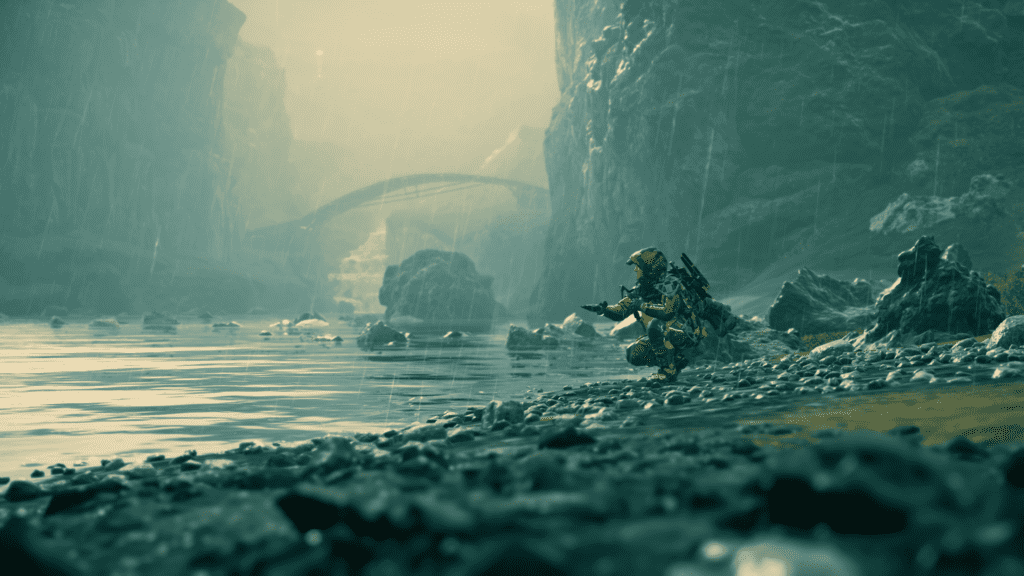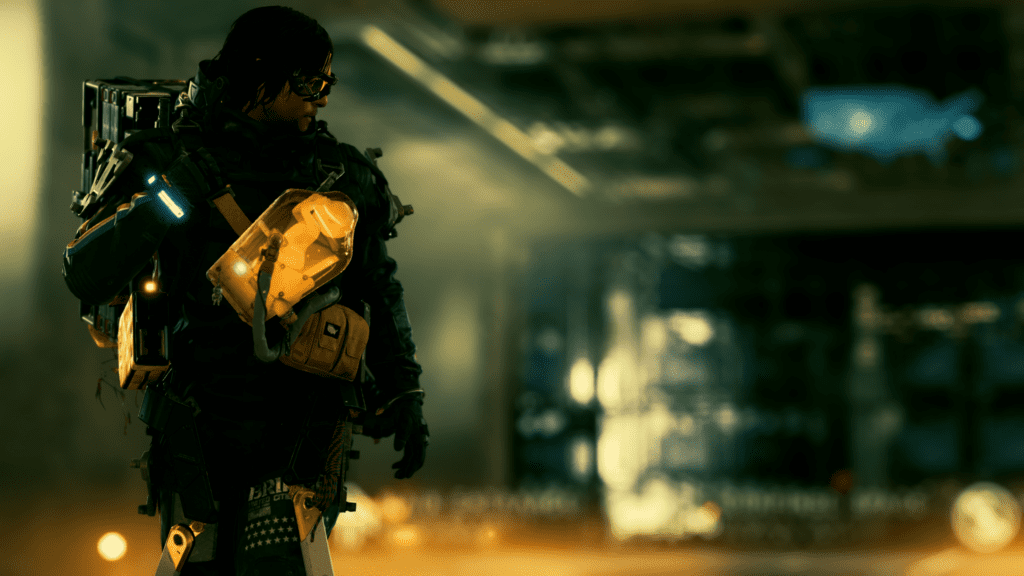The clearest sign that you’ve done a good job in Death Stranding is when a satisfied customer showers you in likes. And so they should, for its these virtual kudos that fuel post-apocalyptic logistics, their unmistakable allure fortifying the willpower of weary porters all across the country. Likes equate to renown, and the more well-known you are, the broader your delivery network will become. After scraping together my first thousand likes and adorning my porter uniform with its maiden star patch, my job had eased into a contented rhythm that was easy to appreciate. If I wasn’t hauling cold-storage against the clock, then I was lugging fragile figurines up mountainsides, or wading lakes burdened with hundreds of packets of sleeping pills. The cargo was irreverent, the people even more so, and the irresistible simplicity of it all wonderfully overstated by the breadth of the world that lay ahead.
Across treacherous peaks of blinding white, through ceaseless downpours of acid rain, and beneath forest canopies thick with ghostly fissure, the objective stays the same even as the parameters vary. It’s easy to lose hours at a time to the carefully crafted uniformity of the core gameplay loop, delicately handling cargo en masse as you sidestep environmental hazards along the safest route to your destination. Additional risks would come in the form of keeping fragile packages intact, ensuring that time-sensitive deliveries remained punctual, and delivering larger requisitions in a single trip, all of which were worth the hassle if only to see progression gauges refresh and lifetime statistics update. With new equipment regularly being made available, it was satisfying to meet the challenges of a world in flux with stubbornly unerring standards. Even in spite of pitfalls like botched encounters with hoarder encampments, or mishaps involving dicey river crossings, there was no greater achievement than completing a contract with a flawless grade. The planning and execution of the perfect delivery brought with it a gradual cathartic relief, and the notion that you were continually improving your understanding of the environment an easing sense of calm.
Though there aren’t too many things that will upend a mellow amble quite like the arrival of the next narrative beat. Death Stranding does its utmost to orchestrate collisions between the simple and the spectacular, regularly buffeting its otherwise tranquil pacing with a jarring sensory whiplash. If it isn’t a trench skirmish during the First World War that wrests you from your placidity, then it will be the moment that black slag completely engulfs your coveralls, and a tide of grasping claws drops you at the feet of an undulating monstrosity. The story of Death Stranding is awash with symbolism and is mired in the abstract, yet from beneath it all, the frequent disassociation does succeed in painting a deeper picture of the world you inhabit. Contentment is regularly at odds with potent pangs of anxiety, if not due to the spectres that seek to swallow you whole, then due to the existential numbness that thrives as you become more aware of humanity’s impermanence. Seeing your cargo melt into the oily slack and the wiry tendrils clamber downward from the clouds is a reminder of the America that remains, and the downright absurdity of committing yourself to such menial tasks in spite of the intangible horror that surrounds you. But by the time that you begin to question why you’re putting so much effort into paving roads, building bridges and erecting watchtowers, Death Stranding’s message of coexistence will have likely resonated in some form. Throughout the story, you’re told of the eruptions that heralded the planet’s destruction, and how the consequences of near extinction have undone the bonds of mortality. The world of the post-apocalypse has too few souls left to wage a war against the ethereal, and so you’ll remain a deliveryman first and foremost, albeit one with the added burden of charting this new land step by step. Death Stranding places a greater importance on the mundane rather than the malevolent, and in doing so, imparts its meaning directly through player interaction. The challenges ahead of you just aren’t as terrifying when you realise that you won’t have to face them alone. And in a world where you will encounter more holographic projections than living people, it’s the smaller acts of social connection that keep you moving forward.
How fortuitous it was then to return to Death Stranding at a time when social starvation was the answer to our own real-world strife. My incarnation of America hadn’t changed much, save for the mass degradation of structures I had once considered essential to getting me from point to point. If I was going to act out an epilogue to my time with the game, then I could at least endeavour to keep all of them functioning for a little while longer. One more trek from corner to corner seemed like the perfect tonic to quell some of the isolationist gloom, anyway. Throughout my initial foray with the game, I had accomplished almost everything that you could, from building highways and collecting data fragments, to pacifying terrorists and vanquishing Eldritch horrors. All that remained now was to take stock of just how devastating my absence had been to the things that I had created. And how flattering it was to be greeted by a lump sum of likes upon my return, a belated reward for my messy network of bridges and shelters across the lower reaches. Chasing virtual thumbs-up was as delightfully patronising as ever, especially as I had become more invested in hitting specific milestones. It was little over three-hundred thousand by the time I returned, and with every character improvement having already been acquired, now came the time to deliver without the hindrance of over-exerting myself for the sake of a bigger reward. This was Death Stranding after hurricanes and the tidal waves had abated, after the narrative had ended and the author had left. At least this time I was allowed to bring my camera.
There was just something different about playing Death Stranding without having to worry about the passing of time. Many of the games that I have played in my life sparked my imagination with only a modicum of effort: a single still, a fragment of footage, an unfinished blurb. And Death Stranding was no different. Five black etches in the clouds, a beach littered with aquatic corpses, and one lone figure standing in opposition—the sort of premise you’d expect to find scribbled on a coffee shop napkin. Just the possibility of a game showing me something that I hadn’t seen before was enough. In that, Hideo Kojima’s vision certainly didn’t disappoint. Too often, the games I latched on to tantalised the mind with something wonderfully unique, only to revert to type with the flick of a switch. It was always the same vacant game-spaces laden with unintuitive fodder, or the same gameplay systems bogged down in stubborn archaisms. But not in the case of Death Stranding. Not in the game about delivering packages and trying not to fall over.
It was the right game for the right time. Along the route between the distribution centre and the destination, all that existed was what you chose to engage with. And everything that I did felt completely unique to the world that I was a part of. Often, despite having inundated myself with multiple orders, I would disembark from my bike and fish for player packages bobbing in a river, or to unhook my harness and spend a little while relaxing in a natural spring. Even when off-duty and sequestered in my personal room, it became something of a ritual spend my first moments after waking up doing nothing in particular. If I wasn’t instructing Sam to pull faces in the bathroom mirror, then I was watching as he slammed a six-pack of Monster energy drink without blinking. There just wasn’t a need to rush, especially when it felt like the world was going to wait for me, both in and out of the game. Now more than ever, with the flux having subsided and the stillness having set in, there was peace. Package by package, mile by mile, it became clear that Death Stranding was a smaller experience masquerading a something much larger. Especially while burdened with an enforced solitude, it was easy to appreciate that.

